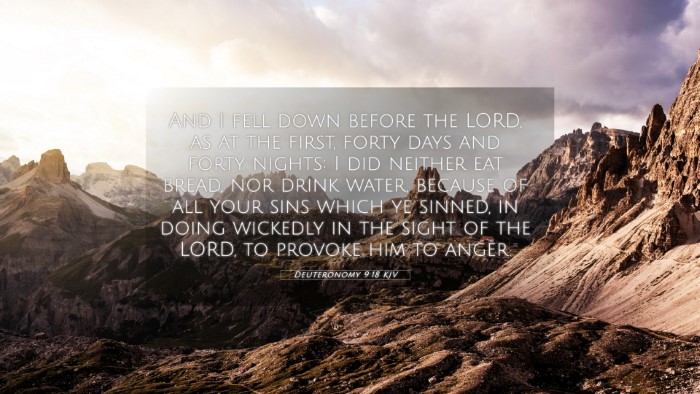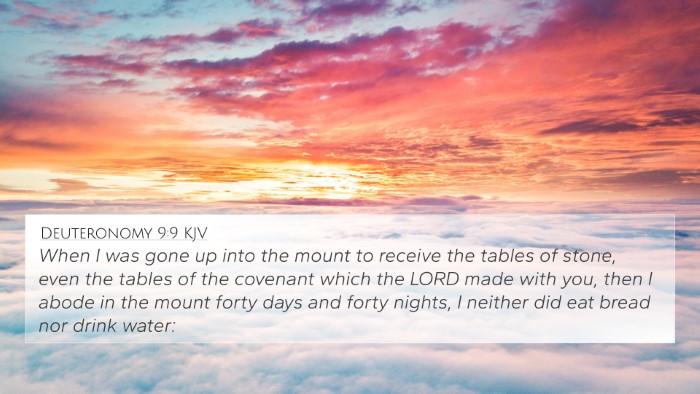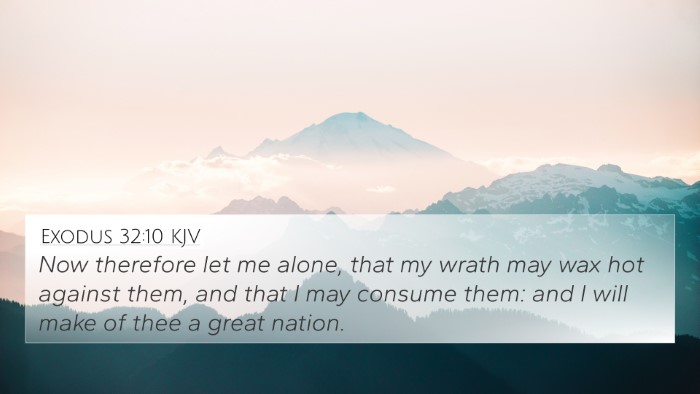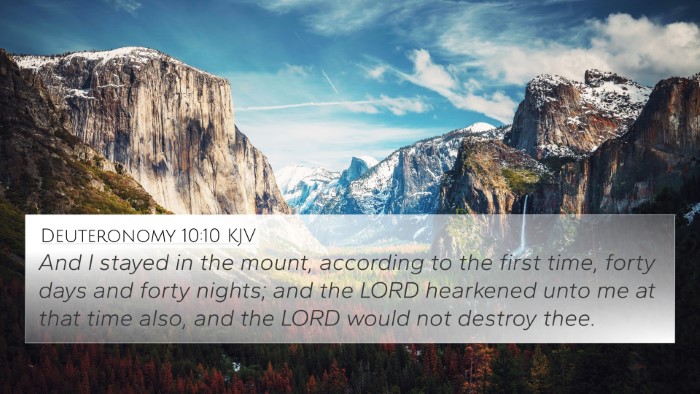Understanding Deuteronomy 9:18
Verse: Deuteronomy 9:18 - "And I fell down before the LORD, as at the first, forty days and forty nights: I did neither eat bread nor drink water, because of all your sins which ye sinned, in doing wickedly in the sight of the LORD, to provoke him to anger."
Summary of Meaning
This verse illustrates Moses' deep intercession for the Israelites, emphasizing the themes of sin, repentance, and earnest prayer. It speaks to the gravity of the people’s actions against God and reveals Moses’s role as a mediator. Public domain commentaries bring out several key insights:
- Matthew Henry: Moses’ fasting for forty days symbolizes a profound commitment to seeking mercy for his people. This period reflects the seriousness of their transgressions and his own dedication in pleading for their forgiveness.
- Albert Barnes: The verse highlights the significance of Moses's role as intercessor, showing that the people had provoked God to anger. Barnes emphasizes that through fasting and prayer, Moses exemplified the necessary humility before God.
- Adam Clarke: Clarke notes that the act of not eating or drinking for such an extended period is extraordinary, signifying the depth of distress felt by Moses. He underscores the necessity of divine intervention in the face of impending judgment on the people.
Key Themes
This verse encapsulates several primary spiritual principles:
- The Importance of Intercession: Moses's act of fasting represents the heart of an intercessor, embodying prayer as a vital component of seeking God’s forgiveness.
- Recognition of Sin: The mention of Israel’s wickedness serves as a critical reminder of the nature of sin that separates humanity from God.
- God’s Mercy: The verse implicitly points toward the hope of redemption and mercy that can be found in sincere repentance and prayer.
Cross-References
Several Bible verses parallel this concept of sin, repentance, and intercession:
- Exodus 32:11-14: Moses pleads with God for Israel’s forgiveness after the golden calf incident.
- 1 Timothy 2:1-4: Encouragement for believers to pray for all people, highlighting the broader theme of intercession.
- James 4:6-10: The call for humility and repentance before God, correlating with the idea of falling down in prayer.
- Psalms 106:23: A reminder of Moses’s intercession which spared Israel from destruction.
- Isaiah 53:12: The Suffering Servant, who bore the sin of many, resonating with the sacrificial nature of Moses's mediation.
- Lamentations 3:40: Encouraging reflection and return to God, which aligns with the themes in Deuteronomy 9:18.
- Acts 7:52-53: Stephen references the stubbornness of the Israelites, echoing the rebellion that provoked God in Moses's time.
Connections Between Bible Verses
This section will explore how Deuteronomy 9:18 connects with several other scriptures:
- Divine Judgment and Mercy: The connections between Deuteronomy 9:18 and Romans 5:20, which discusses how sin abounds but grace much more abounds.
- Fasting and Prayer: Ties to Matthew 6:16-18 that unfolds the significance of fasting as an act of humility before God.
- God's Anger and Remorse: Links back to Exodus 34:6-7, where God's nature and the patience He has towards sinners are revealed.
Inter-Biblical Dialogue
Deuteronomy 9:18 serves as a bridge in a larger inter-Biblical dialogue that explores themes of divine anger, human sinfulness, and the necessity of repentance:
- Connection to New Testament Understanding: Romans 3:23 emphasizes that "for all have sinned and fall short of the glory of God," reinforcing the significance of acknowledgment of sin in Deuteronomy.
- Application in Daily Life: The verse invites readers to contemplate their own lives, emphasizing the need for confession and seeking God's mercy.
Conclusion
In summary, Deuteronomy 9:18 serves as a powerful reminder of the weight of sin, the necessity of fasting and prayer, and the role of an intercessor. It establishes insightful connections with a multitude of other scriptures, enhancing our understanding of God's character and His desire for humanity to turn back to Him. Through this understanding, we can apply the principles of this verse to our lives today, embracing the call to intercede for others and seek reconciliation with God.








